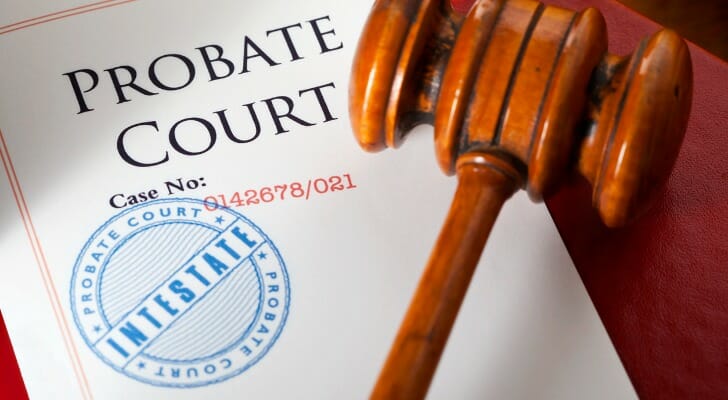 More often than not, people want to leave their assets and property behind to people they care about when they pass. But sometimes individuals don’t make a will or die with debts. In such cases (among others), their property has to pass through a probate court. It’s possible that you may have to act as an executor of an estate holding one of these properties. Or, there may be an option for future homeowners who want to buy lower-priced real estate. Either way, you’ll have to understand the process of a probate sale. Here’s a rundown on how it works.
More often than not, people want to leave their assets and property behind to people they care about when they pass. But sometimes individuals don’t make a will or die with debts. In such cases (among others), their property has to pass through a probate court. It’s possible that you may have to act as an executor of an estate holding one of these properties. Or, there may be an option for future homeowners who want to buy lower-priced real estate. Either way, you’ll have to understand the process of a probate sale. Here’s a rundown on how it works.
Working with a financial advisor can help you execute your estate plans as efficiently and correctly as possible.
What Is a Probate Sale?
While many homeowners rely on estate planning to organize their assets, some pass without a will in place. This is also known as dying intestate. Or, they may die with debts in their name. In these cases, the decedent’s property enters a legal process called probate. A court oversees the sale of this property with the goal of selling it for the best price possible.
How Does a Probate Sale Work?
Just as how estate planning and foreclosure procedures vary by state, so does the probate process. Generally, though, the goal is to sell the property for the best price as is. Learning how the process works can help prepare you if you ever find yourself involved in one. It includes a number of steps:
Appointing an Executor of Estate
If the deceased didn’t leave a will, the court appoints an executor of estate. The executor, also called the estate representative, is typically the next of kin or another living relative of the decedent. They help get the decedent’s affairs in order and take care of the home’s sale.
Hire a Qualified Real Estate Agent
The executor of the estate doesn’t conduct the sale alone. He or she hires a real estate agent to support the process. While many real estate agents have enough knowledge for this, it’s recommended that the estate representative choose one with probate experience. That ensures everything moves along according to the proper procedure. A Certified Probate Real Estate Specialist (CPRES) agent would likely be the best choice.
Get an Appraisal
Home appraisals are a key part of purchasing a home, whether it’s a traditional or probate sale. They are crucial since they determine the property’s value. But the process is the same as a normal sale. Costs for an appraisal depend on your location, with the average single-family home costing around $347.
Advertise the Property
The hired real estate agent advertises the property using MLS listings, public signs, etc., just like any other sale. However, they must note the probate status on the listing.
Obtain Offers
If a buyer wants to purchase the property and makes an offer, they must include a deposit of 10% or more. This proposal gets sent to the probate judge if the seller approves of it. The judge then decides whether to allow the sale to move forward.
Petition the Court
If the judge approves and the executor of the estate accepts the offer, the process goes back to court. The probate attorney sets up a court date around 30 to 45 days after the acceptance. This doesn’t take the property off the market, though. Other buyers may make offers, which the seller and court can accept.
Get Court Approval
Confirmation from the court requires the attendance of all accepted buyers. Then, on the court date, each eligible buyer petitions the judge. This transpires in the same way as an auction, where the buyers try to outbid one another until the judge confirms one.
Make a Deposit
The winner can’t just walk away with the deed. They have to present a cashiers check worth 10% of their winning bid immediately to the court. If they don’t have enough money or a cashier’s check, the runner-up wins the property.
Sign the Contract
The court accepts the cashier’s check, and the winning bidder signs a contract. The executor of the estate also signs this paperwork. The contract cannot include any contingencies or conditions, though.
Inspect the Property
There is a safeguard in place for the buyer. They can inspect the property after they sign the contract. If the inspection report reveals negative items, like roofing issues or pests, the buyer can retract their purchase. Unfortunately, there is no reimbursement for the deposit. According to Home Advisor, home inspection costs sit in a similar range to appraisals. Most homeowners will spend around $279 to $399.
Close the Sale
If the inspection comes back positive, then the buyer can close on the property. The property is officially sold 15 days following the contract signing.
How Long Does a Probate Sale Take?

A sale for a traditional home can move quickly. When there is no competition, and the house is well taken care of, things progress even faster. According to the National Association of Realtors (NAR), 88% of homes sold in April 2021 remained on the real estate market for less than a month. In contrast, the process lasts longer with a probate sale. There are multiple hands involved, including the court, which drags out the timeline.
In addition, complaints from heirs, competition, an overburdened court and red tape can further draw it out. Because of this, probate sales can take anywhere from a few months to over a year.
What to Know About Buying a Probate Property
Buying a home or piece of real estate always comes with its pros and cons. Probate properties are no different. So here is what you’ll want to keep in mind if you are considering this type of purchase:
Advantages
The key benefit to buying a probate property is lower prices. They typically sell below market value since the estate representative usually wants the process completed quickly. This allows investors to buy cheaply and then resell the property for a profit.
Buying a probate property tends to be easy as well since there is less competition than with other properties. Even short sales or foreclosed homes see more competition since few people learn about probate sales. Some also avoid them due to the longer timeline and court involvement.
Disadvantages
Unfortunately, there are a few drawbacks to buying a probate home that you should consider. Firstly, the timeline can be a problem. It takes a while to complete the process, possibly years, due to the court involvement. That means buyers may need to wait a while before they can close, which they may not actually have time for.
Secondly, the contract can’t include contingencies, unlike a traditional real estate purchase. So, there is little flexibility. Either you can retract your offer, but lose your deposit, or go through with the sale. This can be difficult since homes in this situation sell as is. The executor of the estate rarely fixes the place up beforehand. Therefore, going through with the purchase can incur hefty costs in the future as you address problems on the property. Since the owner passed, you don’t have anyone to discuss the home’s history either, which can help in these situations.
Future homeowners should weigh the pros and cons carefully. Real estate investors also need to determine if they will make more money off the property than they put into it.
Is Buying a Probate Property Right For You?
It’s possible for real estate investors to turn a probate property into a profitable venture. But it takes careful consideration. Working with a real estate agent who understands the process can help you find the best deal. A reliable home inspector can also help you avoid properties that need expensive fixes.
Alternatively, you may not have the time or money to sink into a property right now. The process may involve more red tape than you’re ready to handle and might require more time than you have. Carefully weigh out your options before taking on the associated risks. Again, talking to someone with experience can help you decide whether you should move forward.
The Takeaway
 Probate sales are sometimes complex and lengthy. They can also be a gamble for investors and prospective homeowners alike. That’s why it might be wise to work with someone who understands the process, can access probate records online and can help you navigate any hurdles. A real estate attorney has experience in the field and can advise you on the best course of action. You can stay on top of local probate sales by checking with your local probate court clerk or looking online for nearby listings.
Probate sales are sometimes complex and lengthy. They can also be a gamble for investors and prospective homeowners alike. That’s why it might be wise to work with someone who understands the process, can access probate records online and can help you navigate any hurdles. A real estate attorney has experience in the field and can advise you on the best course of action. You can stay on top of local probate sales by checking with your local probate court clerk or looking online for nearby listings.
Tips for Estate Planning
- Estate planning requires you to understand your current resources and long-term financial prospects. A financial advisor is a great resource for that. SmartAsset makes it simple to find one with its free matching tool. In only minutes, it connects you with local financial advisors ready to help. If you want to benefit from the insights of a financial advisor, get started now.
- Inheritance laws and estate taxes differ by state. SmartAsset’s estate planning guide will be a source of help to you when planning your own estate.
- Knowing how much you will have when you retire is a key component of estate planning. A free retirement calculator can give you a good estimate of what your financial resources will be when you retire.
Photo credit: ©iStock.com/stocknshares, ©iStock.com/kazuma seki, ©iStock.com/PeopleImages